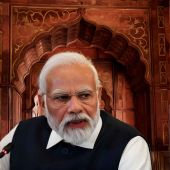"वाह रे सरकार": TMC leader Atish Sarkar threatened to distort and display pictures of protesters' mothers and sisters, and hang them on their doors, sparking fierce protests in West Bengal after a 31-year-old doctor's brutal murder in Kolkata; suspended

In a deeply unsettling development from Kolkata, Atish Sarkar, a leader associated with the All Indian Trinamool Congress (AITC/TMC), has been officially suspended for a period of one year. This disciplinary action comes in the wake of Sarkar's alarming threats directed at demonstrators who were actively protesting against a grievous incident—the rape and murder of a trainee doctor at RG Kar Medical College and Hospital. The incident that sparked widespread outrage occurred on the 9th of August at this hospital located in Kolkata.
|
The protests, marked by their intensity, have been a constant scene in West Bengal as the public outcry grows over the fate of the 31-year-old trainee doctor. Amidst these protests, on the 1st of September, Sarkar—who is notably the spouse of a TMC councillor from Habra—vehemently lashed out at the demonstrators.
During his vitriolic outburst, Sarkar revealed, “Didi has instructed us to hiss,” indicating directives from higher up within his party. Hailing from Ashoknagar in the North 24 Parganas district, which lies approximately 50 kilometers northeast of Kolkata, his comments have added fuel to an already volatile situation.
The intensity of his threat was stark: “Those of you who are abusing Didi, engaging in her character assassination, if we make obscene posters of your mothers and sisters and put them on your walls, you won’t be able to remove them. I will make a distorted picture of your mother and sister and hang it on the door of your house. You will not be able to leave your house. That day is going to come soon.” Such statements have not only shocked the local community but have also drawn severe criticism from various quarters, leading to his subsequent suspension by the party.
|
Following a deeply troubling pattern within the Trinamool Congress (TMC), Atish Sarkar’s threats against protestors highlight an ongoing aggressive stance that the party seems to uphold against dissent. Sarkar chillingly warned, “Be careful, TMC men are on the streets,” and issued a stark challenge: “If we start hissing at every locality in the mornings and evenings, will you be able to step out of your homes?” These remarks, made by a leader of a major political party, underscore a menacing tactic aimed at instilling fear among citizens voicing their discontent.
The reaction to Sarkar’s incendiary comments was rapid; he was suspended by the TMC for a year as his words sparked outrage on social media. Yet, the suspension feels more like a performative gesture rather than a genuine step towards reform within the party. This incident is not an isolated one within the TMC, as other party leaders have similarly exploited their positions to intimidate and belittle protestors.
|
On the very same day, TMC Lok Sabha MP from Bankura, Arup Chakraborty, also attacked those protesting the horrific rape and murder of a junior doctor at RG Kar Hospital. His words were equally harsh, claiming that the protesters, whom he accused of “misleading people,” would “flee like dogs” the moment the TMC intensified their measures. He pronounced at a party gathering in his constituency, “Awaken your conscience,” and urged, “Save (West) Bengal. Stand with Mamata Banerjee. We are there in Delhi’s Parliament. Trinamool Congress workers will have to hiss. Friends, you hiss and they will flee like dogs, they will run like foxes.”
Atish Sarkar, the suspended leader, articulated a sentiment reflecting a blend of defiance and provocation. "We wanted change, not revenge, after coming to power in 2011. But they have crossed all limits. They are misleading the people and making them say that people will not accept Kanyashree or Durga Puja grants (in protest against the rape and murder case). If they have guts, they should take out a rally and show how many people are with them," he stated emphatically. This statement attempts to discredit the legitimacy of the protests by challenging the protesters to demonstrate public support, insinuating that their grievances lack widespread backing.
|
Further, Sarkar called on the party’s female members and student workers to actively oppose the demonstrators, urging a direct confrontation rather than seeking dialogue or resolution. This strategy not only deepens the divide but also escalates the potential for conflict.
Sarkar's contentious remarks didn’t stop there. In another public meeting on August 19th, he expressed controversial views on the medical community involved in the protests: “If doctors, instead of treating patients and in the garb of protests, roam about with their boyfriends or go home and the patients die, there will be public outrage. If hospitals get gheraoed, they should not come to us to save them,” he declared. These comments are particularly inflammatory, suggesting a disregard for the professional and personal integrity of the protesting doctors, further accusing them of neglecting their duties.
The context in which these statements were made is crucial. Protests have been ongoing for over three weeks across Bengal, triggered by the rape and murder of the trainee doctor in Kolkata. The sluggish progress in the investigation, questionable conduct of local administration, and the West Bengal government's harsh measures to suppress the protests have only amplified the public's frustration and anger. This scenario highlights a grim reality where governmental response is marred by attempts to suppress dissent through intimidation and coercion rather than addressing the root causes of the unrest and ensuring justice. The ongoing situation poses significant questions about the effectiveness of governance and the protection of fundamental rights in the state.
 Support Us
Support Us
Satyagraha was born from the heart of our land, with an undying aim to unveil the true essence of Bharat. It seeks to illuminate the hidden tales of our valiant freedom fighters and the rich chronicles that haven't yet sung their complete melody in the mainstream.
While platforms like NDTV and 'The Wire' effortlessly garner funds under the banner of safeguarding democracy, we at Satyagraha walk a different path. Our strength and resonance come from you. In this journey to weave a stronger Bharat, every little contribution amplifies our voice. Let's come together, contribute as you can, and champion the true spirit of our nation.
 |  |  |
| ICICI Bank of Satyaagrah | Razorpay Bank of Satyaagrah | PayPal Bank of Satyaagrah - For International Payments |
If all above doesn't work, then try the LINK below:
Please share the article on other platforms
DISCLAIMER: The author is solely responsible for the views expressed in this article. The author carries the responsibility for citing and/or licensing of images utilized within the text. The website also frequently uses non-commercial images for representational purposes only in line with the article. We are not responsible for the authenticity of such images. If some images have a copyright issue, we request the person/entity to contact us at This email address is being protected from spambots. You need JavaScript enabled to view it. and we will take the necessary actions to resolve the issue.
Related Articles
- "Vote: The only commodity that is peddleable without a license": Supreme Court refuses to interfere with Calcutta High Court's direction for deployment of central forces in West Bengal for local body elections, dismisses the petitions by the State and SEC
- “No sympathy for that person”: Calcutta HC declines to list bail plea of TMC bāhubali Sheikh Shahjahan, facing 43 charges like rioting, sexual assault, his arrest after 2-months on the run highlights a major clash between state power & judicial authority
- “The government is hanging me”: Sanjay Roy, accused in the RG Kar Medical College rape-murder case, claims he is being framed by the govt as his daily trial starts November 11 with CBI presenting DNA evidence, CCTV footage, and mobile location records
- "Hair pulled, stripped naked, beaten with sticks": In a chilling echo of Palghar 2020, three sadhus faced a brutal mob attack, highlighting the perilous journey of religious figures in West Bengal, raising alarms over communal violence and police inaction
- "डॉक्टर सौदागर": CBI arrested former RG Kar Medical College principal Sandip Ghosh and associates for heinous crimes like selling unclaimed bodies, extorting students, and accepting kickbacks from medical suppliers; Ghosh also underwent a polygraph test
- "विनाशकाले": After the Kolkata doctor rape and murder, now an IAS officer’s wife raped twice at gunpoint while her husband posted outside Bengal, with police purposely delaying the case, Calcutta High Court lambasted Mamata Banerjee's govt for its failure
- ED's raid on West Bengal's TMC leader sees 800-1000 strong mob violence; 3 officials gravely injured, investigations reveal Mallick's daughter's Rs 3.37 crore and wife's Rs 4.3 crore bank deposits post-demonetization, raising major laundering suspicions
- "मां, माटी, मानुष": Another RG Kar case in West Bengal as a 11-year-old minor Hindu girl brutally raped, murdered, and dumped in a canal, sparking outrage, women protestors clashed with police, pelting stones & wielding sticks under Mamata Banerjee's govt
- In a major setback to the Mamata Govt, Kolkata HC empowered 80 Sandeshkhali women, including Priyanka Tibrewal, to file complaints, ensuring their testimonies verified & identities protected, Pramit Roy champions for witness protection as CBI takes charge
- "Who is going to believe a con artist? Everyone, if she is good": Following TMC minister Partha Chatterjee, his ‘close aide’ Arpita Mukherjee and ex personal secretary arrested by ED, more than ₹21 crores seized from residence of Arpita
- Bengal: The Chilling Accounts Of Families Of Two BJP Workers Who Can Return Home Only If The Women Are ‘Given Up’ To Trinamool Gangsters
- "एक डॉक्टर की मौत": Dr KolkataNirbhaya, a 2nd year PGT, found brutally raped & murdered at RG Kar Medical College, Kolkata; her autopsy exposed horrific injuries and vaginal bleeding, amid attempts by authorities to mislabel her violent death as a suicide
- Kolkata erupts in outrage as residents turn off lights in solidarity, Swiggy and Zomato partners lead massive protest, uniting thousands to demand justice for the brutally murdered RG Kar doctor, accusing Mamata Banerjee’s govt of a failed investigation
- "ममता दीदी": In West Bengal, TMC worker Firoz Khan brutally rapes a married woman at gunpoint for rejecting his advances, inserts a gun into her genitals, and captures assault on video, all while her 4-year-old son watched in terror tied in a gunny bag
- "सरकार उनकी है तो क्या": In a startling revelation to the Supreme Court, the West Bengal govt admitted some Muslim castes were added to OBC list in less than 24 hours, while others included even before applying, exposing significant procedural breaches













